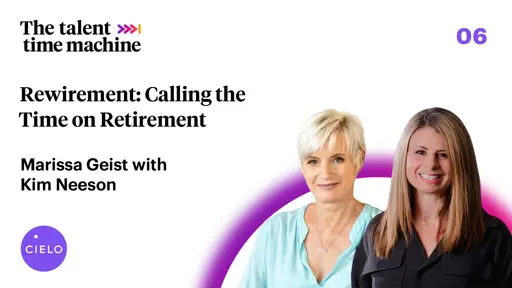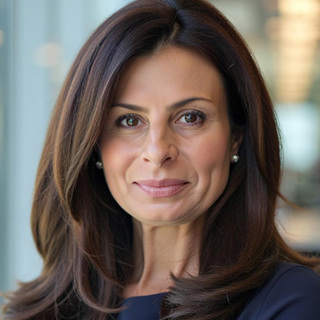Change brings more change
In a world of increasing lifespans, aging workforces and retirement benefits programs designed for a different time, retirement as we know it may completely change by 2050.
Business coach Kim Neeson spoke with CEO Marissa Geist about how multi-generational workforces could change the dynamics of employment in the not-so-distant future. Read on for highlights of their conversation from episode six of “The talent time machine” podcast.

Editor’s note: This interview has been edited for clarity and brevity.
With aging workforces globally, how are the dynamics of retirement going to change by 2050?
Kim: I think we're all working a lot longer than we anticipated. But I think it will look different. We're not probably going to be working the 9-5, for a number of reasons. Physically, we're still going to age. But to keep engaged in society and to feel a part of something, we’re all going to have to be doing something with our lives, such as part-time employment, where it's not mandatory retirement at 65. So, you still keep that historical information that carries through with a company, maybe mentoring the next generation to give that historical perspective where it's needed.
Marissa: If you think of the employer, I'm thinking about our thousands of folks that sit in our company, and we're currently not set up to have that kind of very flexible knowledge working. We're going to have to be set up to have someone plug in in a very different way.
Many businesses with multi-generational workforces may struggle to adapt to these more flexible arrangements.
What will be the biggest challenges?
Kim: Businesses have to change. The workforce of 2019 is not coming back. Company culture is going to be the thing that really drives productivity and business visions and goals, so companies are going to have to reassess if they're going to retain their talent. Also, populations are getting older, birth rates are down. You're going to have to engage people by saying “as you get older, you may want to do some other things.”
I had my own business for many years, and when I sold that I knew I still wanted to do something. I rewired myself, but I wanted to be able to do it on different terms. I didn't want 60-hour weeks anymore. I think companies will have to recognize that as people age, they can still do things. Maybe they're going to have more vacation time, but their salary will reflect that. And you'll still have income as an older person and not just rely on pensions.
Marissa: I have a 20-year-old son, and how he thinks about the role of work in his life is very different from how I or my parents thought about it. We have to accommodate for the older generation being more flexible, but I see that he's going to demand just as much flexibility. He doesn’t envision himself living to 90 and working at one company.
[Young people] are not just satisfied with getting paid a wage and working their way up the chain.
We’re already seeing people change jobs many times through their careers.
Will 25-year tenured employees become a thing of past by 2050?
Kim: The days of the gold watch are over. Young people’s values are different, and they want purpose in what they're doing. They're not just satisfied with getting paid a wage and working their way up the chain.
But by the same token, where do you go with that? Because one of the things that increases your earnings is your experience, right? So how can you find an area where you could try different avenues, but carry some of that experience so that you could benefit from it financially?
Marissa: Yes, you could get kind of stuck. If we have people that are serial hoppers moving from company to company, soon, you have no backbone of the people that really had to stick it out. One of the things we're challenged with even now is if there's not a long legacy at your last few roles, you can't tell if they actually were effective.
Do you think “mini career breaks” will replace traditional retirement?
How do you see that evolving for aging workforces?
Kim: I think flexibility is going to be huge, across every age group. Companies are going to have to allow their employees to take periods of time if they want to learn something new. And if you could allow someone to do that, without completely losing productivity, it gives you time as a company to prepare if they're going to move on, to bring somebody else along or help get the training, etc. That might be one way to tackle it.
And I think older workers are going to want more flexibility in terms of the hybrid model. Also, the flexibility for people at home with their children being able to do some work, that's going to be very important.
Marissa: Flexibility will be so important. You’ll have to create the space for having children to work. By 2050, there will probably be incentives to take time off to have kids, because most of the world isn’t naturally replacing its population now. Assuming that continues, that's quite a different dynamic to deal with. When I was having children, it was almost a nuisance for you to have children in the middle of the year. Now, it’s more accepted, with more time off.
Technology is becoming an increasingly pervasive part of our lives.
Do you think by 2050 everyone will be used to being constantly connected?
Kim: It’s likely. Because I'm 60, but I'm still used to technology. So, everybody coming up is going to have some level of comfort. And I assume with AI, I’ll soon just tell the computer what I want. I do think we have to start drawing those hard lines around when you're not at work because people do actually take real breaks.
There are lots of people for whom this stuff is addictive. So, how do we, at least from the work perspective, try to give that break. As a society, that's something we're going to have to grapple with.
Some people may become physically incapable of certain jobs in aging workforces.
How will they fit into this new system in 2050?
Kim: I think there's going to have to be some kind of investment in learning. One of the things I’ve pondered is governments saying, “what if you go back and retrain?” Maybe it's in retail or something less physical, for example, but they will pay you to go and retrain.
Not everyone will, of course. But who knows, with AI and all the changes we're seeing, you're not going to have to learn how to run complicated software. Maybe it's just a matter of learning how to talk to a computer.
Marissa: It's a great point, especially about the automation. We need to think about how technology works with the population, taking out the physicality of roles now.
One of the great things changing the conversation now is we’re getting comfortable with talking about different types of employment. When some companies think about older talent, it’s almost about engaging them as a service, as opposed to really thinking of the value that they bring into the workplace – the mentoring and the experience.
Kim: There’s also judgement. Judgement is a soft skill that’s hard to teach. If you're younger and not sure what to do, you could have that older person to speak to. There's a lot of value to that. It can give confidence and pass that generational wisdom down.
Marissa: Balancing ambition and energy with experience and perspective is so important. You don’t want a team where everyone is out to prove themselves. If someone’s come back into the workforce role in an advisor role, it’s because they’re comfortable with what they do. Their decisions, motivations, communication, and engagement all come from a different place that creates stability, even if the other generation isn't actively seeking it from them. That will balance out the energy in the workplace and help the framing and cadence of decisions and grow the wisdom of the group.
CieloBalancing ambition and energy with experience and perspective is so important.
Any parting words for people as they look forward to 2050?
Kim: Be open, keep a love of learning, and keep engaged. It’s so healthy for us on so many levels – our mental health and physical health – to stay active, whatever that means to you. But that doesn't mean you have to start working at 65. You can just start the next chapter, and you just rewire.
Marissa: It was a pleasure to have you. Thank you so much for sharing your talents and your insight.
About the experts

Chief Executive Officer, Cielo
Marissa is the Chief Executive Officer of Cielo, the world’s leading global talent acquisition partner. She joined Cielo in 2015 as Senior Vice President of Global Operations, where she was instrumental in scaling Cielo’s delivery model.
LinkedIn connect
Business Coach, Kim Neeson Consultancy
With almost three decades of experience as an award-winning entrepreneur and national business leader, Kim Neeson brings her unique skill set to high performing women entrepreneurs and business leaders.
LinkedIn connect



